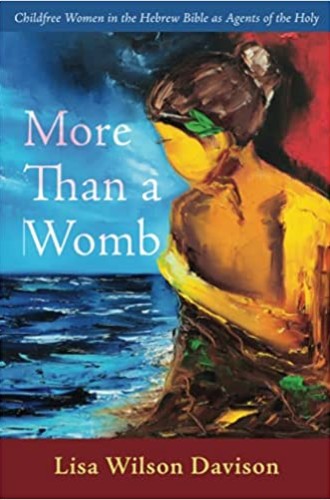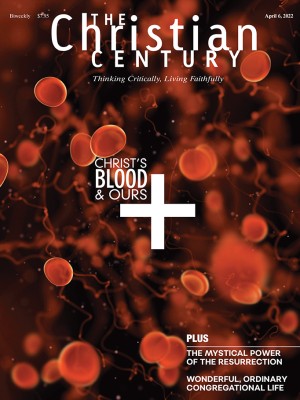Miriam, Esther, and other biblical non-mothers
Lisa Wilson Davison showcases women who thrive despite—and perhaps because of—their childfree state.
I was immersed in More Than a Womb when the news broke about Pope Francis criticizing those who have pets instead of children. “This denial of fatherhood or motherhood diminishes us, it takes away our humanity,” he was reported as saying. Those who immediately pointed out that the pope himself is childless missed the point that men are not judged for lack of children the same way women are. Women’s humanity has long been linked to children, including in the Bible.
Hebrew Bible professor Lisa Wilson Davison showcases child-free women in scripture who thrive despite—and perhaps because of—their state. She opens her book with a personal story about criticism she received from a local newspaper reporter questioning her choice to remain child-free. The reporter referenced Psalm 127:3—children are “a heritage from the Lord”—so Davison pointed to the more ambiguous material that follows in the psalm. “Obviously the newspaper reporter did not realize or remember that I teach the Hebrew Bible for a living,” Davison writes. Readers of More than a Womb will be grateful that she does, because her expertise and insight create an engrossing experience.
Read our latest issue or browse back issues.
Davison writes in her introduction about how churches can be especially negative, however well-meaning they are, to those of us who aren’t mothers. She uses the word motherize to describe “the process by which a woman who is not a mother is made to become like a mother so that others feel more comfortable.” She names the practice that some churches have of presenting all women with flowers on Mother’s Day because they want to recognize all women. While the church I serve as rector does not indulge in this custom, I have often been greeted with “Happy Mother’s Day” in church despite my child-free status, followed by comments such as “You are a mother to us all” or “You are a mother to your dog.” I look forward to using Davison’s term motherize in writing and casual conversation in the future when confronted by such annoyances.
Davison identifies how even some feminist biblical scholars have been guilty of motherizing. She argues that “in our zeal to find an important role for women, we have been complicit in the patriarchal system of continuing to limit a woman’s worth to the biological role of motherhood,” and she details how some feminist scholars have assumed motherhood for biblical women who are not identified as mothers, such as Deborah and Huldah. Davison, on the other hand, works with a child-free feminist approach to the interpretation of scripture.
Before launching into chapters devoted to specific women, Davison walks readers through a survey of the Hebrew Bible. She demonstrates how crucial women’s fertility is in Genesis, how this concern fades from Exodus, and how it returns in Judges. She points out that birthing a child seems to be more important than actually raising one, given, for example, Hannah’s experience with Samuel.
Davison theorizes that motherhood was likely emphasized for two reasons. Life was precarious in the ancient Near East, with people constantly dying from famine, plague, and war, so births were needed to resupply the population. Secondly, the process of bearing children was dangerous for women. A strong case for birthing babies was needed to promote “the pronatalist ideals of those who told, repeated, collected, or perpetuated the texts.” Davison shows examples of professional roles for women beyond motherhood, such as mourners, musicians, scribes, diviners, and midwives.
Much of the book consists of chapters devoted to specific women. Davison uses her expertise in Hebrew to argue against erroneous interpretations of texts, such as the mistaken idea that Miriam sings to an all-female gathering rather than a mixed-gender one after the crossing of the Red Sea. She also provides new insights with her translations, including referring to Miriam as “the people’s prophet.” She uplifts Deborah as a warrior, Huldah as the first woman who uses a written document to pronounce a prophecy, and Esther as a cultic leader.
Davison does not whitewash these female characters; instead, she encourages readers to ponder their flaws. For instance, in the passage where Miriam is punished with leprosy for challenging Moses (Num. 12:1–15), Davison wonders whether Miriam may have been speaking against Zipporah not because she was “foreign” but because the strange story about Zipporah circumcising her son (Exod. 4:24–26) was a threat to Miriam’s own authority.
The chapter “Other Women: A Medium and Wise Women” discusses three women who appear in the books of Samuel. The medium of Endor whom Saul consults (1 Sam. 28:3–25) is sometimes described as a witch, but Davison argues against this association, instead making a case for translating the Hebrew word as “shaman.” She elucidates arguments from other scholars about how the meal the medium of Endor serves to Saul may be more of a sacred meal than simple hospitality. Davison emphasizes the wisdom of the unnamed woman of Abel of Beth-macaah who negotiates with Joab, resulting in Sheba’s head being thrown over the city wall in order to save the other inhabitants (2 Sam. 20:14–32), and the wise woman of Tekoa who confronts David about Absalom (2 Sam. 14:1–22). She sweeps aside the argument that the woman of Tekoa must have been a mother herself and points out how the parable not only lifts up Absalom but quietly condemns David for not doing anything after his daughter was assaulted.
Davison concludes by bringing readers back to the present time, pointing out how “religious communities can be some of the most inhospitable places for childfree persons.” Reading this book together could be a first step for such communities to overcome this prejudice.






